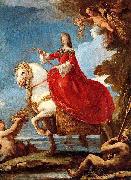Wholesale Oil Painting No Minimum |
|||||||||||
|
|
|||||||||||

|
|||||||||||
|
|
|
||||||||
Luca GiordanoItalian Baroque Era Painter, ca.1634-1705 Italian painter and draughtsman, active also in Spain. He was one of the most celebrated artists of the Neapolitan Baroque, whose vast output included altarpieces, mythological paintings and many decorative fresco cycles in both palaces and churches. He moved away from the dark manner of early 17th-century Neapolitan art as practised by Caravaggio and his followers and Jusepe de Ribera, and, drawing on the ideas of many other artists, above all the 16th-century Venetians and Pietro da Cortona, he introduced a new sense of light and glowing colour, of movement and dramatic action. |
||||||||
|
|
||||||||
Portrait of Maria Anna of Neuburg
Portrait of Maria Anna of Neuburg Painting ID:: 75061 |
1693-1694
Oil on canvas
81 X 61 cm (31.89 X 24.02 in)
cjr 1693-1694 Oil on canvas 81 X 61 cm (31.89 X 24.02 in) cjr |
|||||||
|
|
||||||||
|
Luca Giordano 1632-1705 Italian Luca Giordano Gallery Charles II of Spain towards 1687 invited him over to Madrid, where he remained for 10 years (1692-1702). In Spain, he produced works for the Royal Palace of Madrid, the Buen Retiro palace, El Escorial, Toledo, and other sites. Giordano was popular at the Spanish court, and the king granted him title as a "caballero". One anecdote of Giordano's speed at painting is that, he was once asked by the Queen of Spain what his wife looked like. On the spot, he painted his wife into the picture before him for the Queen. In Spain he executed numerous works, continuing in the Escorial the series commenced by Cambiasi, and painting frescoes of the Triumphs of the Church, the Genealogy and Life of the Madonna, the stories of Moses, Gideon, David and the Celebrated Women of Scripture, all works of large dimensions. His Dream of Solomon (1693, now at Prado) dates from this period. His pupils, Aniello Rossi and Matteo Pacelli, assisted him in Spain. In Madrid he worked more in oil-colour, a Nativity there being one of his best productions. Portrait of Maria Anna of Neuburg Date 1693-1694 Medium Oil on canvas Dimensions 81 ?? 61 cm (31.9 ?? 24 in) cyf |
||||||||
|
|
||||||||
|
Prev Next
|
||||||||
|
|
||||||||
|
Related Paintings to Luca Giordano :. |
||||||||
|
|
||||||||
|
CONTACT US |

